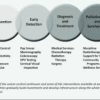Ayurvedic Dietary Guidelines for Managing Hypertension
Ayurvedic Dietary Guidelines for Managing Hypertension or high blood pressure, is a growing health concern worldwide, linked to a variety of serious conditions such as heart disease, stroke, and kidney problems. Managing hypertension often requires a multifaceted approach, including lifestyle changes, medication, and dietary modifications. Ayurveda, the ancient system of medicine from India, offers a holistic approach to health that can be particularly effective in managing hypertension.

In Ayurveda, hypertension is generally considered a result of an imbalance in the body’s doshas, particularly Pitta and Vata doshas. This imbalance can lead to the accumulation of toxins and excess heat in the body, contributing to high blood pressure. Ayurvedic dietary guidelines focus on balancing these doshas, promoting overall health, and supporting the cardiovascular system.
Here’s an in-depth look at Ayurvedic dietary guidelines to manage hypertension effectively:
1. Understanding Your Dosha
In Ayurveda, every individual is believed to have a unique constitution or dosha—Vata, Pitta, and Kapha. Hypertension is often linked to imbalances in the Pitta dosha, characterized by excess heat and inflammation, and the Vata dosha, associated with dryness and irregularities.
- Pitta Dosha: Excess Pitta can lead to high blood pressure due to its heating and inflammatory qualities. It is essential to cool and calm Pitta through diet and lifestyle adjustments.
- Vata Dosha: An imbalance in Vata can contribute to irregular blood pressure and stress. It is crucial to stabilize Vata through grounding and nourishing foods.
2. Incorporating Heart-Healthy Foods
Ayurvedic dietary guidelines emphasize foods that support cardiovascular health and help manage blood pressure:
- Leafy Greens: Spinach, kale, and collard greens are rich in potassium and magnesium, which can help regulate blood pressure. They also contain antioxidants that reduce inflammation.
- Berries: Blueberries, strawberries, and raspberries are high in antioxidants and vitamins that support heart health and reduce oxidative stress.
- Whole Grains: Brown rice, quinoa, and barley provide essential nutrients and fiber, which can help maintain healthy blood pressure levels and support overall cardiovascular health.
- Nuts and Seeds: Almonds, walnuts, and flaxseeds are excellent sources of healthy fats, magnesium, and fiber, which contribute to lower blood pressure.
3. Balancing Pitta and Vata Doshas
To manage hypertension, it’s important to balance the Pitta and Vata doshas through diet:
- Cooling Foods: To balance Pitta, include cooling foods like cucumbers, melons, and coconut. These foods help counteract excess heat and inflammation in the body.
- Hydrating Foods: To stabilize Vata, focus on hydrating and grounding foods such as cooked vegetables, soups, and stews. These help counteract dryness and promote a sense of stability.
- Avoid Spicy and Salty Foods: Spicy foods can aggravate Pitta, while excessive salt can contribute to high blood pressure. Opt for mild, soothing flavors and use herbs like cilantro and mint.
4. Embracing Ayurvedic Herbs and Spices
Ayurvedic herbs and spices play a significant role in managing hypertension:
- Turmeric: Known for its anti-inflammatory properties, turmeric helps reduce inflammation and supports cardiovascular health. Incorporate it into curries, soups, and teas.
- Ashwagandha: This adaptogenic herb helps reduce stress and stabilize blood pressure. It can be taken in supplement form or added to smoothies.
- Cardamom: Cardamom helps balance Pitta and supports digestion. It can be used in cooking or added to herbal teas.
- Hawthorn Berry: Hawthorn is known for its positive effects on heart health. It can be taken as a supplement or brewed into a tea.
5. Adopting a Regular Eating Schedule
Regularity in eating patterns supports balanced doshas and overall well-being:
- Eat at Consistent Times: Try to have meals at the same times each day to regulate digestion and maintain stable energy levels.
- Avoid Late-Night Eating: Eating late at night can disrupt digestion and contribute to imbalances. Aim to finish your last meal at least 2-3 hours before bedtime.
6. Hydration and Detoxification
Adequate hydration and detoxification are crucial for managing hypertension:
- Drink Warm Water: Warm water aids digestion and helps flush out toxins. Start your day with a glass of warm water with a squeeze of lemon to kickstart detoxification.
- Herbal Teas: Herbal teas such as hibiscus, ginger, and cinnamon can support cardiovascular health and aid in detoxification.
7. Mindful Eating and Lifestyle Practices
In Ayurveda, lifestyle practices complement dietary guidelines for managing hypertension:
- Practice Mindful Eating: Eat slowly and mindfully, savoring each bite. This practice aids digestion and helps prevent overeating.
- Manage Stress: Incorporate stress-reducing techniques like meditation, yoga, and deep breathing exercises to support overall health and balance blood pressure.
- Get Adequate Sleep: Ensure you get enough restful sleep each night, as poor sleep can negatively impact blood pressure and overall health.
8. Personalized Approach
Ayurveda emphasizes the importance of a personalized approach to health:
- Consult an Ayurvedic Practitioner: For a tailored plan, consult with an Ayurvedic practitioner who can assess your dosha and recommend specific dietary and lifestyle changes.
- Monitor Your Blood Pressure: Regularly monitor your blood pressure to track your progress and adjust your dietary and lifestyle practices as needed.
Conclusion
Ayurvedic Dietary Guidelines for Managing Hypertension dietary guidelines offer a comprehensive approach to managing hypertension by addressing imbalances in the doshas and supporting overall cardiovascular health. By incorporating heart-healthy foods, balancing doshas, using beneficial herbs and spices, maintaining a regular eating schedule, staying hydrated, and adopting mindful eating and lifestyle practices, you can effectively manage high blood pressure and promote overall well-being.
Remember, Ayurveda is about balance and harmony. By integrating these principles into your daily life, you can create a supportive environment for your body to thrive and maintain optimal health. Always consult with a healthcare professional before making significant changes to your diet or lifestyle, especially if you have existing health conditions or are on medication.
Embrace the wisdom of Ayurveda and take proactive steps towards a healthier, balanced life.








Leave a reply